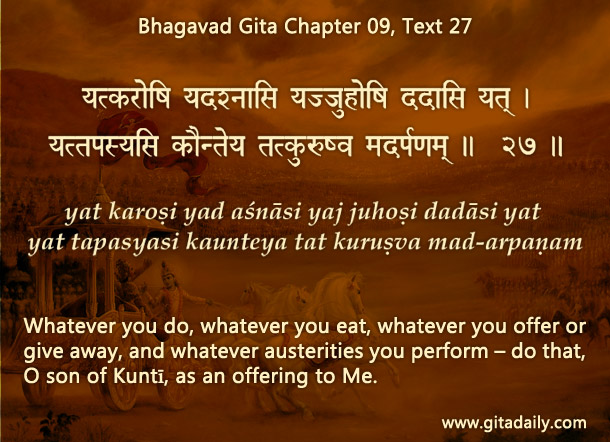Suppose a policeman feels guilty about putting a vicious criminal in solitary confinement. If that criminal has been duly tried and convicted, then the policeman’s feeling of guilt is misplaced.
Misplaced guilt is relatively easy to detect in professional settings. But it becomes much more difficult to detect in more personal settings, when dealing with our relatives. Such was Arjuna’s situation on seeing his cousins, the Kauravas, assembled on the opposite side of the battlefield at Kurukshetra (Bhagavad-gita 01.27). He thought his greed was causing the war, but the actual cause was the Kauravas’ greed – as he saw when the Gita expanded his vision beyond the immediate battlefield to the battle between vice and virtue in every human heart.
Everyone has to themselves fight to ensure the triumph of virtue over vice. Of course, we can and should help each other. But if someone gives themselves to vice, becoming its willing and wily instrument, as had Duryodhana, then they need to be given the consequences. Otherwise, they will simply become more vicious and hurt others even more – and be eventually hit hard by their own accumulated bad karma.
Suppose we have an alcoholic relative. If they keep relapsing without really trying to reform and if we keep picking up the pieces after each alcoholic episode, we will be simply enabling their alcoholism. As their vice worsens, a time will come when we won’t be able to help them – maybe no one will.
That’s why we need to stop shielding them from the consequences of their actions without giving in to misplaced guilt. The resulting pain they suffer may be the only way to save them from far greater pain.
One-sentence summary:
If we let ourselves feel guilty for things we aren’t responsible for, we let the guilty get away with things they are responsible for.
Think it over:
- Why was Arjuna’s guilt misplaced?
- What’s wrong with misplaced guilt?
- Do you feel guilty in any of your interactions? Analyze if that guilt is misplaced.
***
01.27: When the son of Kunti, Arjuna, saw all these different grades of friends and relatives, he became overwhelmed with compassion and spoke thus.


Thank you very much prabhu ji. Very nice and inspiring text. Hare Krishna 🙏
Thanks, happy to be of service.